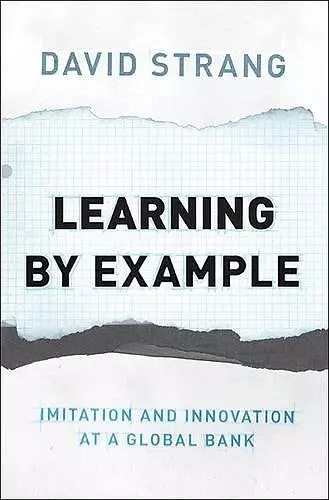Learning by Example
Imitation and Innovation at a Global Bank
Format:Hardback
Publisher:Princeton University Press
Published:2nd Jul '10
Should be back in stock very soon
This hardback is available in another edition too:
- Paperback£30.00(9780691171197)

The best book I have read on benchmarking. A penetrating account of why firms benchmark, how they construct reference groups, and how they learn and unlearn from examples. -- Hayagreeva Rao, Stanford University Graduate School of Business and author of "Market Rebels" Learning by Example provides a nuanced view of the individual, social, organizational, and institutional roots of innovation diffusion and organizational change. This book will have impact. It belongs on the scholar's desk as well in the practitioner's office. -- Michael Tushman, Harvard Business School There is now a huge literature on the spread of management techniques across organizations. However, there is an extreme paucity of work that examines exactly what happens in firms when they adopt such innovations. Qualitative in its approach, this important and original book breathes fresh air in an area that is often too dominated by quantitative studies of the phenomenon. -- Eric Abrahamson, Columbia University Learning by Example tells the fascinating story of the benchmarking initiative at one of the world's largest banks. The author's access to bank employees and bank records is unparalleled. Based on rigorous research, the book shows that status and the experiences of current workers in other firms shape what programs get copied. This study will revolutionize thinking about organizational learning and innovation. -- Frank Dobbin, Harvard University
In business, as in other aspects of life, we learn and grow from the examples set by others. Imitation can lead to innovation. But in order to grow innovatively, how do businesses decide what firms to imitate? And how do they choose what practices to follow? This title takes a look at the benchmarking initiative of a major financial institution.In business, as in other aspects of life, we learn and grow from the examples set by others. Imitation can lead to innovation. But in order to grow innovatively, how do businesses decide what firms to imitate? And how do they choose what practices to follow? Learning by Example takes an unprecedented look at the benchmarking initiative of a major financial institution. David Strang closely follows twenty-one teams of managers sent out to observe the practices of other companies in order to develop recommendations for change in their own organization. Through extensive interviews, surveys, and archival materials, Strang reveals that benchmarking promotes a distinctive managerial regime with potential benefits and pitfalls. He explores the organizations treated as models of best practice, the networks that surround a bank and form its reference group, the ways managers craft calls for change, and the programs implemented in the wake of vicarious learning. Strang finds that imitation does not occur through mindless conformity. Instead, managers act creatively, combining what they see in external site visits with their bank's strategic objectives, interpreted in light of their understanding of rational and progressive management. Learning by Example opens the black box of interorganizational diffusion to show how managers interpret, advocate, and implement innovations
"Learning by Example is a thoughtful contribution that will enrich the dialogue among sociologists and organization theorists and point to new research questions."--Rosabeth Moss Kanter, American Journal of Sociology
ISBN: 9780691142180
Dimensions: unknown
Weight: 567g
304 pages